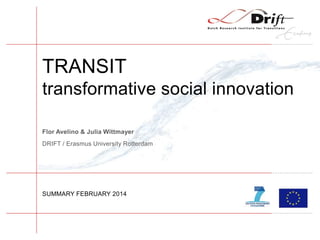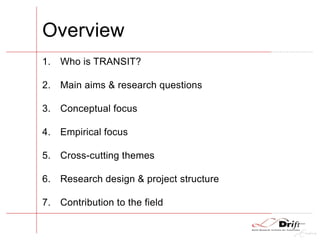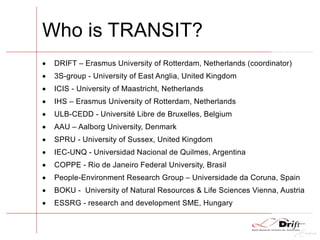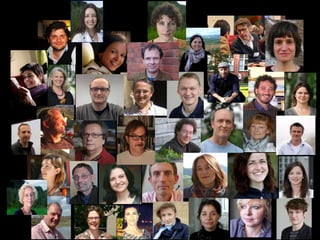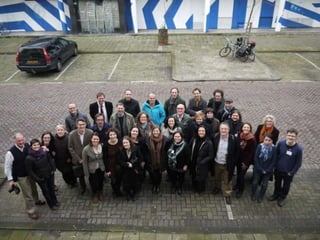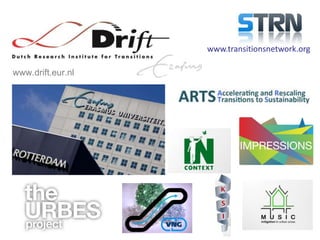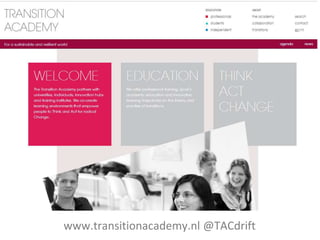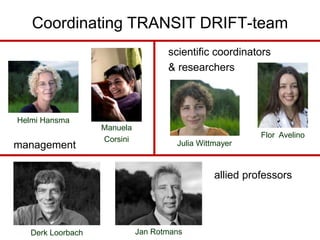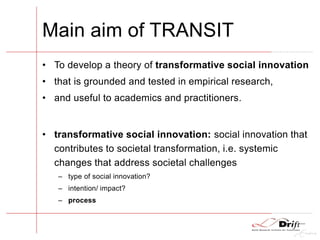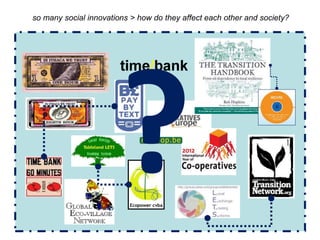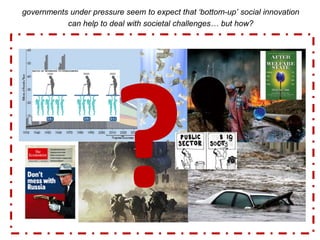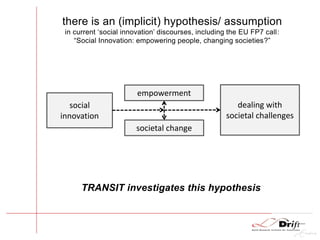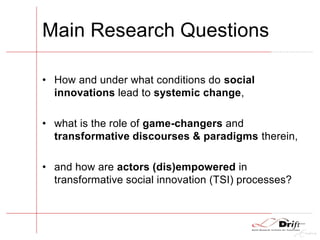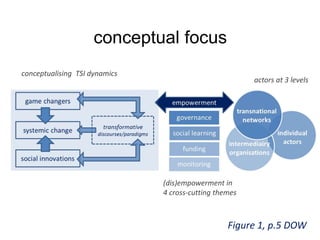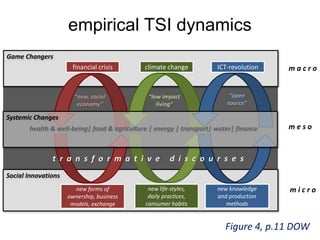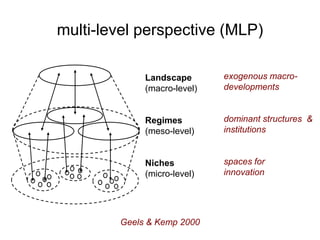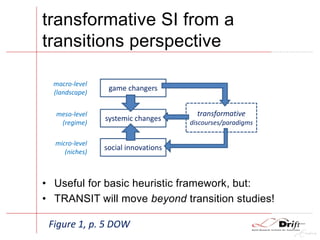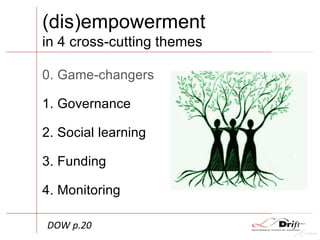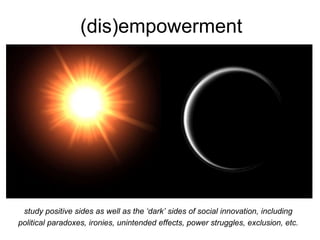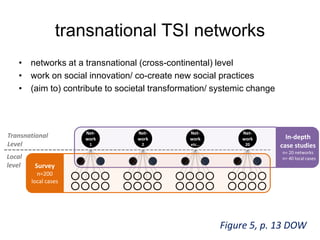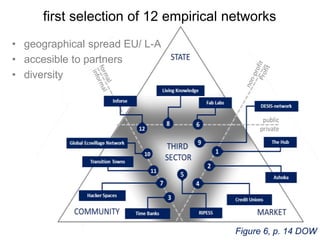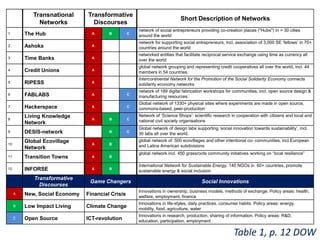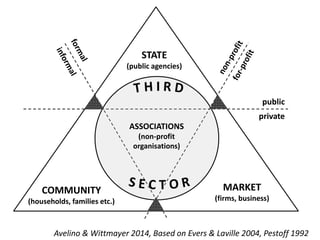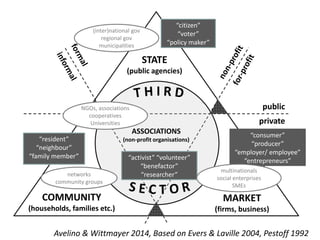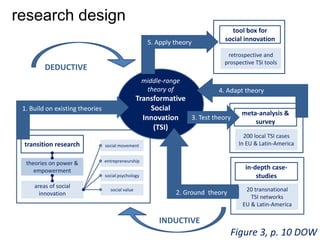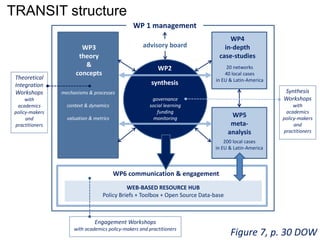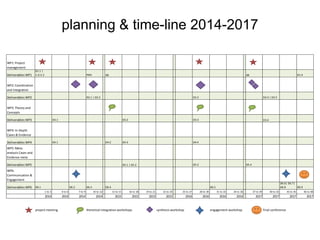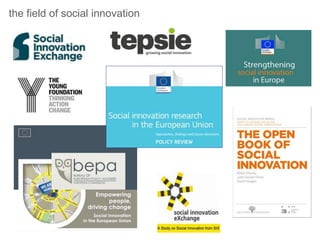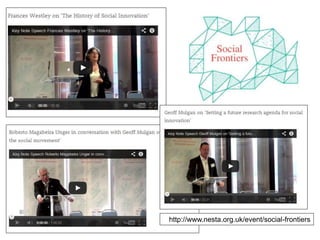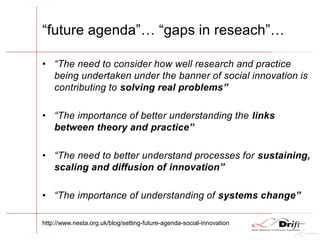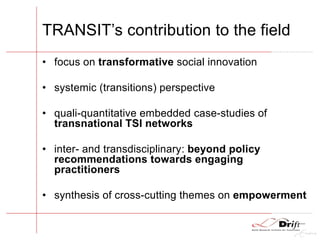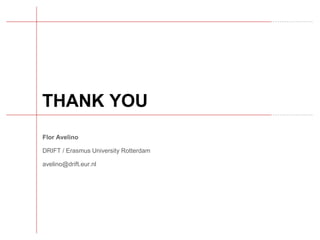Summary of the TRANSIT Project
- 1. SUMMARY FEBRUARY 2014 Flor Avelino & Julia Wittmayer DRIFT / Erasmus University Rotterdam TRANSIT transformative social innovation
- 2. Overview 1. Who is TRANSIT? 2. Main aims & research questions 3. Conceptual focus 4. Empirical focus 5. Cross-cutting themes 6. Research design & project structure 7. Contribution to the field
- 3. Who is TRANSIT? ï· DRIFT â Erasmus University of Rotterdam, Netherlands (coordinator) ï· 3S-group - University of East Anglia, United Kingdom ï· ICIS - University of Maastricht, Netherlands ï· IHS â Erasmus University of Rotterdam, Netherlands ï· ULB-CEDD - UniversitÃĐ Libre de Bruxelles, Belgium ï· AAU â Aalborg University, Denmark ï· SPRU - University of Sussex, United Kingdom ï· IEC-UNQ - Universidad Nacional de Quilmes, Argentina ï· COPPE - Rio de Janeiro Federal University, Brasil ï· People-Environment Research Group â Universidade da Coruna, Spain ï· BOKU - University of Natural Resources & Life Sciences Vienna, Austria ï· ESSRG - research and development SME, Hungary
- 8. Coordinating TRANSIT DRIFT-team scientific coordinators & researchers management allied professors Helmi Hansma Manuela Corsini Julia Wittmayer Flor Avelino Derk Loorbach Jan Rotmans
- 9. Main aim of TRANSIT âĒ To develop a theory of transformative social innovation âĒ that is grounded and tested in empirical research, âĒ and useful to academics and practitioners. âĒ transformative social innovation: social innovation that contributes to societal transformation, i.e. systemic changes that address societal challenges â type of social innovation? â intention/ impact? â process
- 10. so many social innovations > how do they affect each other and society?
- 11. governments under pressure seem to expect that âbottom-upâ social innovation can help to deal with societal challengesâĶ but how?
- 12. there is an (implicit) hypothesis/ assumption in current âsocial innovationâ discourses, including the EU FP7 call: âSocial Innovation: empowering people, changing societies?â TRANSIT investigates this hypothesis social innovation empowerment societal change dealing with societal challenges
- 13. Main Research Questions âĒ How and under what conditions do social innovations lead to systemic change, âĒ what is the role of game-changers and transformative discourses & paradigms therein, âĒ and how are actors (dis)empowered in transformative social innovation (TSI) processes?
- 14. conceptual focus Figure 1, p.5 DOW conceptualising TSI dynamics (dis)empowerment in 4 cross-cutting themes actors at 3 levels
- 15. empirical TSI dynamics Social Innovations Game Changers financial crisis climate change ICT-revolution new forms of ownership, business models, exchange new life-styles, daily practices, consumer habits new knowledge and production methods ânew, social economyâ âlow impact livingâ âopen sourceâ m a c r o m e s o m i c r o Systemic Changes health & well-being| food & agriculture | energy | transport| water| finance t r a n s f o r m a t i v e d i s c o u r s e s Figure 4, p.11 DOW
- 16. Landscape (macro-level) Regimes (meso-level) Niches (micro-level) Geels & Kemp 2000 exogenous macro- developments dominant structures & institutions spaces for innovation multi-level perspective (MLP)
- 17. transformative SI from a transitions perspective game changers systemic changes social innovations transformative discourses/paradigms macro-level (landscape) meso-level (regime) micro-level (niches) âĒ Useful for basic heuristic framework, but: âĒ TRANSIT will move beyond transition studies! Figure 1, p. 5 DOW
- 18. (dis)empowerment in 4 cross-cutting themes 0. Game-changers 1. Governance 2. Social learning 3. Funding 4. Monitoring DOW p.20
- 19. (dis)empowerment study positive sides as well as the âdarkâ sides of social innovation, including political paradoxes, ironies, unintended effects, power struggles, exclusion, etc.
- 20. Net- work 1 Transnational Level Local level In-depth case studies n= 20 networks n= 40 local cases Net- work 2 Net- work etcâĶ Net- work 20 Survey n=200 local cases transnational TSI networks âĒ networks at a transnational (cross-continental) level âĒ work on social innovation/ co-create new social practices âĒ (aim to) contribute to societal transformation/ systemic change Figure 5, p. 13 DOW
- 21. first selection of 12 empirical networks âĒ geographical spread EU/ L-A âĒ accesible to partners âĒ diversity Figure 6, p. 14 DOW
- 22. Transnational Networks Transformative Discourses Short Description of Networks 1 The Hub A B C network of social entrepreneurs providing co-creation places ("Hubs") in > 30 cities around the world 2 Ashoka A network for supporting social entrepreneurs, incl. association of 3,000 SE âfellowsâ in 70+ countries around the world 3 Time Banks A networked entities that facilitate reciprocal service exchange using time as currency all over the world 4 Credit Unions A global network grouping and representing credit cooperatives all over the world, incl. 44 members in 54 countries. 5 RIPESS A Intercontinental Network for the Promotion of the Social Solidarity Economy connects solidarity economy networks 6 FABLABS A C network of 189 digital fabrication workshops for communities, incl. open source design & manufacturing resources. 7 Hackerspace A C Global network of 1330+ physical sites where experiments are made in open source, commons-based, peer-production 8 Living Knowledge Network A B C Network of âScience Shopsâ: scientific research in cooperation with citizens and local and national civil society organisations 9 DESIS-network B C Global network of design labs supporting âsocial innovation towards sustainabilityâ, incl. 30 labs all over the world. 10 Global Ecovillage Network A B global network of 500 ecovillages and other intentional co- communities, incl.European and Latina American subdivisions 11 Transition Towns A B global network incl. 450 grassroots community initiatives working on âlocal resilienceâ 12 INFORSE A B International Network for Sustainable Energy, 140 NGOs in 60+ countries, promote sustainable energy & social inclusion Transformative Discourses Game Changers Social Innovations A New, Social Economy Financial Crisis Innovations in ownership, business models, methods of exchange. Policy areas: health, welfare, employment, finance B Low Impact Living Climate Change Innovations in life-styles, daily practices, consumer habits. Policy areas: energy, mobility, food, agriculture, water C Open Source ICT-revolution Innovations in research, production, sharing of information. Policy areas: R&D, education, participation, employment Table 1, p. 12 DOW
- 23. public private STATE (public agencies) MARKET (firms, business) COMMUNITY (households, families etc.) ASSOCIATIONS (non-profit organisations) Avelino & Wittmayer 2014, Based on Evers & Laville 2004, Pestoff 1992
- 24. public private STATE (public agencies) MARKET (firms, business) COMMUNITY (households, families etc.) ASSOCIATIONS (non-profit organisations) Avelino & Wittmayer 2014, Based on Evers & Laville 2004, Pestoff 1992 âcitizenâ âvoterâ âpolicy makerâ âresidentâ âneighbourâ âfamily memberâ âconsumerâ âproducerâ âemployer/ employeeâ âentrepreneursââactivistâ âvolunteerâ âbenefactorâ âresearcherâ (inter)national gov regional gov municipalities multinationals social enterprises SMEs NGOs, associations cooperatives Universities networks community groups
- 25. theories on power & empowerment social movement areas of social innovation social psychology social value entrepreneurship transition research middle-range theory of Transformative Social Innovation (TSI) 1. Build on existing theories DEDUCTIVE 20 transnational TSI networks EU & Latin-America in-depth case- studies 2. Ground theory INDUCTIVE 200 local TSI cases In EU & Latin-America meta-analysis & survey 3. Test theory 4. Adapt theory retrospective and prospective TSI tools tool box for social innovation5. Apply theory research design Figure 3, p. 10 DOW
- 26. WP 1 management WP3 theory & concepts WP2 synthesis governance social learning funding monitoring mechanisms & processes context & dynamics valuation & metrics WP6 communication & engagement WP4 in-depth case-studies 20 networks 40 local cases in EU & Latin-America WP5 meta- analysis 200 local cases in EU & Latin-America WEB-BASED RESOURCE HUB Policy Briefs + Toolbox + Open Source Data-base advisory board Synthesis Workshops with academics policy-makers and practitioners Engagement Workshops with academics policy-makers and practitioners Theoretical Integration Workshops with academics policy-makers and practitioners TRANSIT structure Figure 7, p. 30 DOW
- 27. WP1: Project management Deliverables WP1 D1.1 | 1.2|1.3 PM1 AB AB D1.4 WP2: Coordination and Integration Deliverables WP2 D2.1 | D2.2 D2.3 D2.4 | D2.5 WP3: Theory and Concepts Deliverables WP3 D3.1 D3.2 D3.3 D3.4 WP4: In-Depth Cases & Evidence Deliverables WP4 D4.1 D4.2 D4.3 D4.4 WP5: Meta- analysis Cases and Evidence meta Deliverables WP5 D5.1 | D5.2 D5.3 D5.4 WP6: Communication & Engagement Deliverables WP6 D6.1 D6.2 D6.3 D6.4 D6.5 D6.6| D6.7| D6.8 D6.9 1 to 3 4 to 6 7 to 9 10 to 12 13 to 15 16 to 18 19 to 21 22 to 24 25 to 27 28 to 30 31 to 33 34 to 36 37 to 39 40 to 42 43 to 45 46 to 48 2014 2014 2014 2014 2015 2015 2015 2015 2016 2016 2016 2016 2017 2017 2017 2017 project meeting theretical integration workshops synthesis workshop engagement workshop final conference planning & time-line 2014-2017
- 28. the field of social innovation
- 30. âfuture agendaââĶ âgaps in reseachââĶ âĒ âThe need to consider how well research and practice being undertaken under the banner of social innovation is contributing to solving real problemsâ âĒ âThe importance of better understanding the links between theory and practiceâ âĒ âThe need to better understand processes for sustaining, scaling and diffusion of innovationâ âĒ âThe importance of understanding of systems changeâ http://www.nesta.org.uk/blog/setting-future-agenda-social-innovation
- 31. TRANSITâs contribution to the field âĒ focus on transformative social innovation âĒ systemic (transitions) perspective âĒ quali-quantitative embedded case-studies of transnational TSI networks âĒ inter- and transdisciplinary: beyond policy recommendations towards engaging practitioners âĒ synthesis of cross-cutting themes on empowerment
- 33. THANK YOU Flor Avelino DRIFT / Erasmus University Rotterdam avelino@drift.eur.nl
Editor's Notes
- #5: Emphasize the great consortium that we have
- #13: the objectives of the research should be to elaborate a common understanding of social innovation, to understand how and under what conditions social innovation leads to change in existing structures, policies, institutions and behaviour, and to identify and assess the factors that are crucial for social innovation to have a sustainable social impact and to be scaled-up.
- #17: The first commonality in transition governance is the multi-level perspective. This is one of the most central analytical tools in transition research. At the macro-level there is the so-called landscape, where we find long-term macro-trends. At the meso-level there is the regime: this refers to the dominant institutions that maintain the status quo, including ingrained routines, regulations and paradigms, vested interests of incumbent actors and mainstream consumption patterns. At the micro-level we find so-called niches: these are spaces where innovation can develop, where people, ideas and technologies deviate from the regime. The reason why fundamental change is so difficult, is because our regimes resist fundamental change. A transition can only occur if the regime is either transformed or replaced.
- #19: Governance. The very concept of âgovernanceâ is inherently about empowering other actors besides government in resolving societal challenges. Such participation requires dedicated governance tools. TRANSIT explores which governance tools are necessary to empower actors to contribute to transformative social innovation processes. Social learning. Social innovation and systemic change inherently require new ways of thinking and doing, which in turn require dedicated learning processes. TRANSIT identifies how learning methods enable transformative social innovation. Funding. A major barrier for many social innovation initiatives concerns the lack of available funding within existing financial structures. TRANSIT identifies new and innovative financing methods for funding transformative social innovation. Monitoring. Knowing how and to what extent social innovation initiatives are succeeding in their goals, and providing suggestions on how to increase this success, is a crucial element of empowerment. TRANSIT analyses and develops methods for monitoring processes of transformative social innovation.

